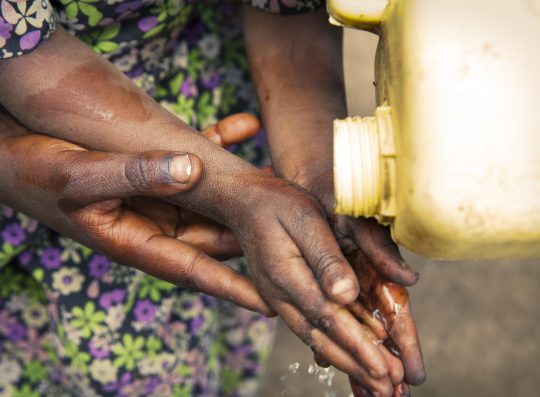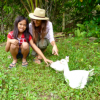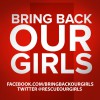Do you want to change the world? You're in the right place! Join us at W4 in empowering girls and women for the benefit of everyone! You can donate to our projects around the world, launch your own team fundraiser, (e-)volunteer your skills and/or spread the word about our work!
How does it work?
Choose one or more projects you care about from our portfolio of projects around the world, make a donation and see the life-changing, even life-saving, impact of your giving!
How does it work?
Create your own uber-cool fundraising team to raise funds for (a) project(s) you care about, then invite your friends/colleagues/family to donate and change the world with you! Multiply the good and multiply your impact!
How do gift cards work?
Offer a friend/colleague/loved one a unique, unforgettable gift with a W4 gift card! When you offer a W4 gift card, the recipient of your gift can choose a project to support from among our many girls' & women's empowerment projects around the world. The recipient of your gift card will receive updates throughout the year about the project, as well as W4 "goodies" relating to the project. So offer a W4 gift card today and spread joy & love!
44719
Provide urgently needed supplies – safe water, soap for handwashing & face masks – for the girls & women in W4’s field programs & their families

THE CHALLENGE
Around the world, the economic fallout of measures being taken to stem the spread of Covid-19 is stark — and it is most severely affecting underprivileged communities, like those of the women and girls who participate in W4’s training, education, and livelihood programs. Even before the pandemic, the families of the young women and girls in our programs lived under the poverty line (of $2.15 per day) and struggled to eke out a living on a daily basis. W4’s training and livelihood programs offer these girls and women an opportunity to acquire the skills and qualifications they need to obtain formal employment. This enables them to determine their own futures, and to break the cycle of poverty in which their families have been trapped.
The Covid-19 outbreak has made living conditions increasingly hard for our students (and their families and communities). As Cameroon, DRC, Nepal, Kenya, the Philippines, Tanzania, and other countries where W4 works have gone into lockdown, countless people whose sole revenue is derived from informal work have abruptly lost their income. The parents of the girls and young women in W4’s programs often engage in informal work, working as day laborers, doing their best to earn vital revenues to feed their families. As the prices of staples have shot up, their access to basic supplies like food and water is now even more limited than before.
In Nepal, for example, poor communities’ access to basic sanitation was already a challenge before the pandemic, with many “houses” lacking running water, even in the capital city of Kathmandu. Now the parents of our Nepali students are prevented from working as a result of confinement measures, and they have no unemployment insurance. These families are thus facing the double threat of both the virus itself and the increasingly constricted access to water and food.
In their efforts to limit the spread of Covid-19, governments are advising or requiring populations to take safety precautions such as regular handwashing, physical distancing, and wearing protective masks. But for many of the girls and women in W4’s programs, when they are not attending W4’s training centers — where they have access to sanitation and meals — it is very hard for them to adhere to these safety measures. They live with their families in confined spaces, lacking sanitation and running water, and for these poor families the cost of soap for regular handwashing is prohibitive, so it is virtually impossible for them to implement such safety measures.
The girls and women in many of W4’s field our programs come from poor families who have no access to running water — indeed, many of them live in informal settlements and camps for displaced persons. It is extremely difficult for girls and women living in very poor areas, slums, and refugee camps to practice the recommended safety precautions to protect their health and limit the spread of the outbreak.
The SOLUTIONS WE'RE PROPOSING
Our team is collecting donations to support the girls and young women in our field programs, and their families, during the Covid-19 crisis period. We are appealing for donations to enable our local teams to distribute urgently-needed basic essentials to our students and their families to help them protect themselves and limit the spread of the Covid-19 outbreak: food staples, water, soap, reusable face masks, and medical assistance if our students become sick with the virus.
THE IMPACT OF YOUR GIVING
Your donation will fund the distribution of vital supplies to girls, women, and families in extremely vulnerable communities. By helping to provide desperately needed basic supplies — including water for drinking and hand washing; soap; reusable face masks; food staples; and medical attention if required — you will enable them to protect their health and limit the spread of Covid-19 in their families, as best they can, during these times of exacerbated hardship.
Thanks to you, these girls, young women, and their families will receive the crucial supplies they need in order to face the health crisis affecting us globally. This will also enable the girls and young women in W4’s program to stay on track in their education and training, which is what opens up for them, and their families (indeed, for their whole communities), a pathway out of poverty.
NOTE:
100% of your donation will be allocated to funding these vital supplies. W4 is committed to ensuring transparency and tracking the on-the-ground impact of every single donation. Our team will report back to you on the precise use and the impact of your donation.
Find out more about W4’s above-mentioned training and livelihood programs here:
Option 2
Option 3
Option 4
Option 5
Option 6
Option 7
Support us by sharing
and raising awareness!
Contributors
Maïthé
FranceLindsey
United States
Anahita
PortugalAnonymous
CanadaMary
United StatesSanna
BelgiumCamille
FranceLéa
FranceJenny
United StatesJacques
PolandAnonymous
United States
Lindsey
France
Gita
FranceDonate to this project
ARE YOU SURE YOU WANT TO DELETE?
ARE YOU SURE YOU WANT TO DELETE?
Are you sure ?
Uploading your photo now...
These fields must be completed before you can submit your project :
Save your draft first
In order to submit your project to our team, you have to save it first
Save your draft first
In order to translate your project, you have to save it first
Submit project translation
To proceed, please tick the ?Translation Available? box on the upper right hand side of your project drafting page.
Submit your translation
You are about to submit your translation. After submission, you will not be able to include further edits to your translation until it has been approved by our team.
Select 1-3 categories relevant to your project :
Digital Inclusion
Disabilities
E-mentoring
Economic empowerment
Education
Emergency Relief
End Child Marriage
Environment
Food Security
Health & HIV/AIDS
Human Rights
Human Trafficking & Exploitation
Microfinance
Role models
Technology
Violence against women
















